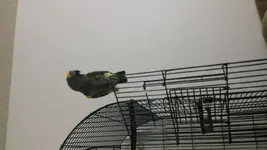SweetiePie
New member
- Feb 8, 2015
- 6
- 0
I inherited SweetiePie -not so sweet - a few years ago. I received him because I was the only person he didn't bite. For maybe 5-10 years before I had him he was never let out of his cage. But before that, from birth to maybe 10 years he had free range all the time. I believe he is 20-25 years old.
I tried letting him out when I first got him. Didn't work out very well. Recently, our other 2 pets died so I am more comfortable letting him out again. I can only do it at night after my kids have went to bed, because he tries to bite both them and my husband. He can do serious damage when he wants to.
Obviously he is not very well trained, if at all. He trusts me but nobody else. So. I've been letting him out, but he only sits on my arm/shoulder or on top of his cage when out. I've started with 20-30 minutes each night. I'll admit I'm even slightly scared of him, because I've seen the damage he can do.
I am in serious need of advice on how to train him. Where to start etc. He doesn't much like to stay on my hand or fingers, he always tries for my shoulder, although I usually try to block him so he stays on my arm. Additionally, I really want to be able to trust him around my boys and husband, but he has a very real fear of any male.
Even advice as to specific toys he'd prefer? He has a rubber hole filled ball with a bell he loves, but any other toy I've introduced he's avoided like the plague.
Sorry this is getting long, but seriously, any and all advice is appreciated.
I tried letting him out when I first got him. Didn't work out very well. Recently, our other 2 pets died so I am more comfortable letting him out again. I can only do it at night after my kids have went to bed, because he tries to bite both them and my husband. He can do serious damage when he wants to.
Obviously he is not very well trained, if at all. He trusts me but nobody else. So. I've been letting him out, but he only sits on my arm/shoulder or on top of his cage when out. I've started with 20-30 minutes each night. I'll admit I'm even slightly scared of him, because I've seen the damage he can do.
I am in serious need of advice on how to train him. Where to start etc. He doesn't much like to stay on my hand or fingers, he always tries for my shoulder, although I usually try to block him so he stays on my arm. Additionally, I really want to be able to trust him around my boys and husband, but he has a very real fear of any male.
Even advice as to specific toys he'd prefer? He has a rubber hole filled ball with a bell he loves, but any other toy I've introduced he's avoided like the plague.
Sorry this is getting long, but seriously, any and all advice is appreciated.


